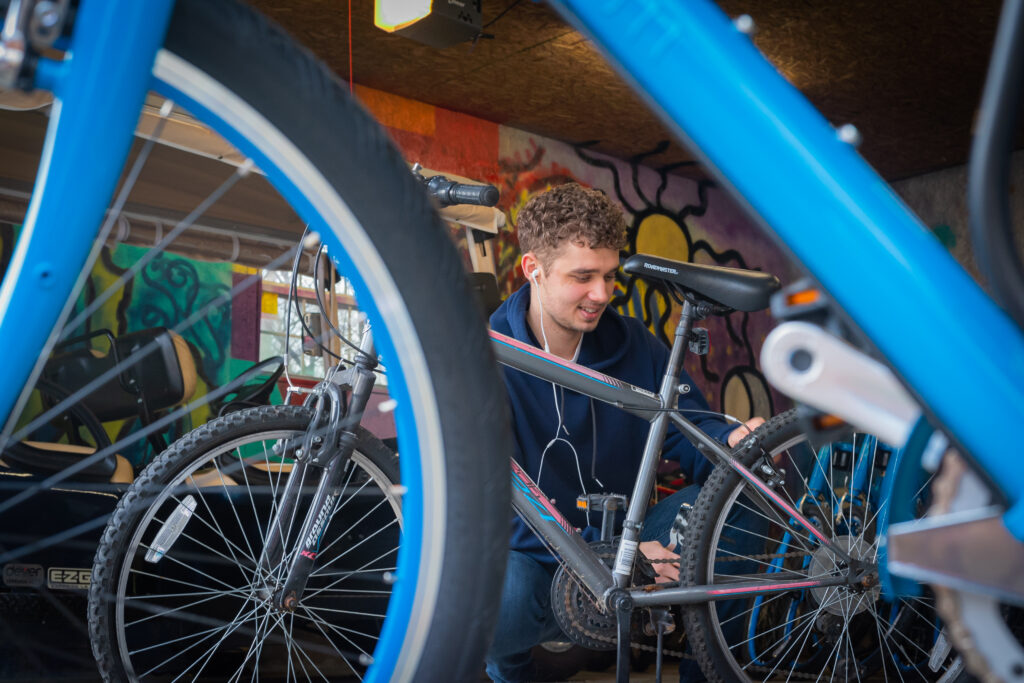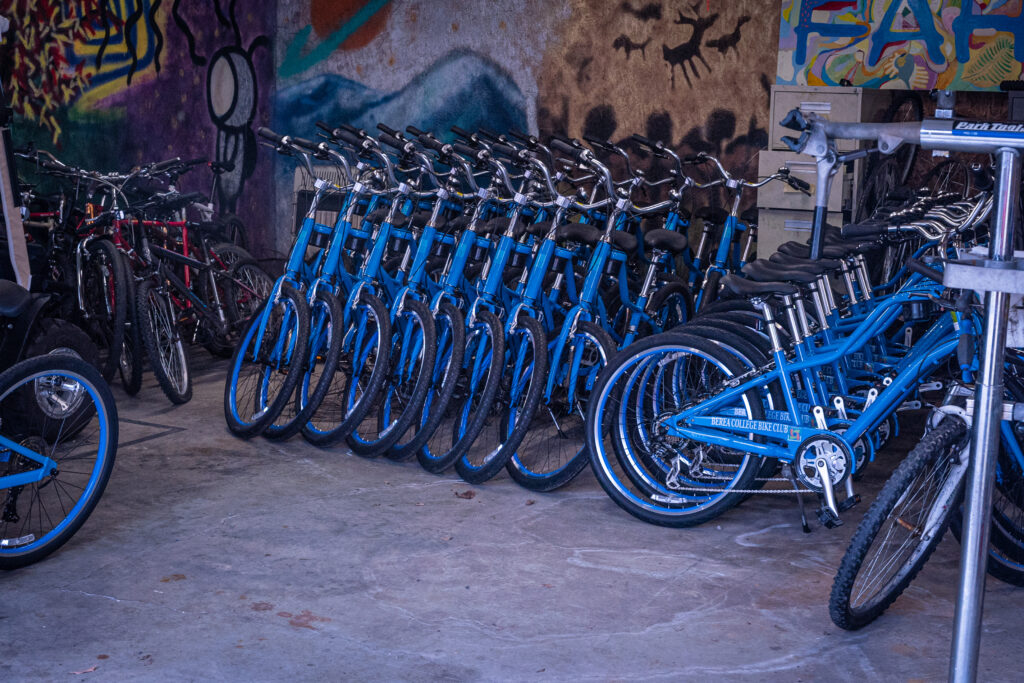It’s a warm spring day on the Berea College campus, and parked blue bikes add color to the landscape. These bikes, which students staying during the COVID-19 pandemic have been making great use of, are part of an initiative by the Office of Sustainability. However, the program began in 2017 with the idea of promoting healthier, eco-friendly habits among students.
Joan Pauly, the College’s sustainability coordinator, knows the transportation sector produces the largest contribution to greenhouse emissions in the United States. Because of this, she thinks of ways she can grow awareness within the campus community.
“If I can introduce an alternative to the car form of transportation to students, then perhaps I can help foster a love for biking not just for recreation or health purposes but also to get from point A to point B in a more efficient and enjoyable way,” Pauly said.
Arriving at Berea about seven years ago, one of Pauly’s first projects was to collaborate with Public Safety in launching the Enterprise car-share system.

“So we started the car share, and once that was running successfully, then the next logical thing to work out was bikes,” Pauly said. The idea was to promote this efficient use of resources to students while at Berea so that they might continue to use car-sharing approaches after graduation.
Before the Office of Sustainability successful implemented the program, the Center for Excellence in Learning through Service (CELTS) and Public Safety had made attempts. Once Pauly and her team of passionate students took it on, various concepts were considered, like fixing bikes that had been abandoned and selling them in surplus. However, the surplus was too large, so the students’ next idea was repurposing them for others on campus. The idea included fixing the bikes in surplus, harvesting the parts of those that could not be fixed and recycling the metal scraps for the rest.
“It didn’t get any better than that as far as the Office of Sustainability goes, so I said, ‘Absolutely,’” Pauly explained.
To make this even better, she worked with Derrick Singleton, vice president for operations and sustainability, to create a labor team that, besides her seven students, included an alternative transportation coordinator and a bike-repair technician.

Pauly credits her student labor team as the No. 1 reason for the success of the bike program.
“They have such a passion for this program that when they’re getting ready to graduate during their senior year, they are on the lookout for their replacement,” she said. “They are out there recruiting because they feel so responsible for making sure the program is successful. It’s been amazing.
“They are the heart and soul of this program,” Pauly added, explaining how her students have educated themselves on how to fix the bikes, and that they love the program so much they would scold a student who left a bike unlocked.
If I can introduce an alternative to the car form of transportation to students, then perhaps I can help foster a love for biking not just for recreation or health purposes but also to get from point A to point B in a more efficient and enjoyable way.
Joan Pauly
Seeing there was a waiting list for bicycles this year, the Office of Sustainability received a generous grant for the purchase of 60 brand-new fleet bikes. After in-person classes and activities ended due to the COVID-19 pandemic, the Office of Sustainability collaborated with Student Life to help students who remained on campus.
“Within 10 minutes of Michael Thomas sending out the email, we received more than 20 requests; it was remarkable,” Pauly said. “I never dreamt a pandemic would be my marketing tool for my bike program. But Lord have mercy, we have gone through bikes,” she said with glee.
The program resulted in 75 bike requests, the renting of 100 percent of Sustainability’s 60 bikes and additional bikes provided by the Health and Human Performance department.
The next week President Lyle Roelofs reported that he and First Lady Laurie Roelofs were walking on the quad when they came upon one student teaching another how to ride her new campus bike.
“That tells you a lot; there’s a need,” Pauly said. “It’s solving a problem.”
In addition to addressing the problem of transportation, Pauly wants to make students aware that the program goes beyond that.
“It is my job to create programs that make it easy for people to do the right thing and become aware of how to do the right thing,” she said.
Joan told me that my job was not only to fix bikes but to help build a culture.
Vidya Mastriyana ’23
“One of my challenges is that I want to create programs that solve challenges, but then I have to reflect back to everyone and explain how it fits into the greater mission of sustainability and reducing greenhouse gas emissions.”
With the bike program, the Office of Sustainability is also providing a service to the community. The office provides free, walk-in bike repair hours for every person, including staff members, students and passing travelers. The service also includes working with churches that have fundraisers and come to the shop looking for spare parts.
Vidya Mastriyana ’23 works as one of the bike-repair technicians. “When initially interviewing me for the position, Joan told me that my job was not only to fix bikes but to help build a culture,” he explained.
This culture, Pauly said, introduces students to sustainability via something they are already familiar with—riding a bike. “Then we also have the potential to take one more car off the road and reduce carbon emissions,” she said, “or at the least create a more bike-friendly environment where drivers are more cognizant of cyclists because they are cyclists, too.”

